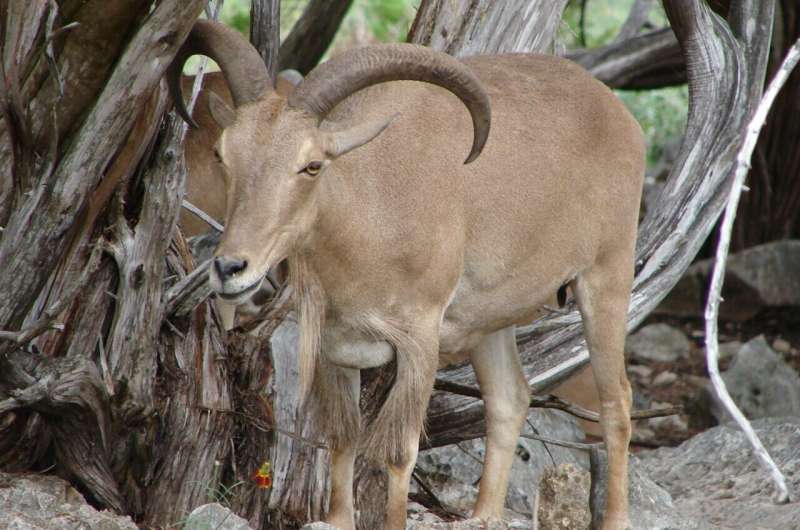This article has been reviewed according to Science X's editorial process and policies. Editors have highlighted the following attributes while ensuring the content's credibility:
fact-checked
peer-reviewed publication
trusted source
proofread
Aoudad and bighorn sheep share respiratory pathogens, research team discovers

A team of researchers at the Texas A&M College of Veterinary Medicine and Biomedical Sciences (VMBS) has discovered that aoudad—an animal in the sheep and goat family—can catch and spread many of the same respiratory pathogens that can impact desert bighorn sheep, a native species in Texas that often shares its habitat with aoudad.
The research, published in the journal PLOS ONE, will help wildlife conservationists better understand the complex relationship between these two species and promote the management of both species.
Aoudad (pronounced "AH-dad") originated in North Africa and were introduced to Texas for hunting opportunities in the late 1950s. Some wildlife experts estimate that there could be as many as 40,000 living in the state.
"There isn't much research about disease transmission between Texas aoudad and native species like bighorn sheep. This makes it difficult for wildlife experts to monitor diseases and preserve animal populations," said Dr. Logan Thomas, an assistant professor at Kansas State University and former postdoctoral researcher under Dr. Walter Cook, a clinical associate professor in the VMBS' Department of Veterinary Pathobiology.
"If we can measure the disease exposure in both species, we can start to understand how they might affect each other," he said. "By analyzing samples from both kinds of animals, we were ultimately able to determine that they too can carry and transmit the same respiratory illnesses."
It takes two
Both aoudad and bighorn sheep are important animals for Texas wildlife conservation and the state's economy. In West Texas, both animals are hunted as game, and some landowners make a significant portion of their income by charging hunters a fee to hunt on their land.
"Aoudad, in particular, are economically valuable for hunting opportunities," Thomas said. "Since they're a non-native species, there are no season or bag limits, which is very attractive to hunters."
While bighorn sheep are also a favorite game animal among hunters, they require intensive management in Texas to keep their population numbers sustainable.
The respiratory diseases, including pneumonia, that both species can share have already wreaked havoc on bighorn populations, raising concerns among experts about what these diseases could do to aoudad, in addition to worsening the situation for bighorns.
"When there are outbreaks of these diseases in bighorn sheep, we usually see two waves of population decline," Thomas said.
"There's a decline in all age groups when the outbreak first happens. Then there's another wave after the lambs are born—many of them don't survive because they haven't been exposed to the disease and therefore lack an immune response like the older bighorns have."
Complicating the problem is that some adult bighorns will carry the disease for several years after the initial outbreak, which means that the population may never have a chance to recover its numbers.
"We've known about this cycle in bighorn sheep for a while now, but no one had studied whether the same thing could happen in aoudad or if the two species could spread these pathogens back and forth," he said. "We don't suspect that it will be a significant health problem for aoudad, but we aim to learn more as we continue our research."
Keeping a close watch
Now that the researchers have confirmed that aoudad can carry the same respiratory pathogens as bighorn sheep, wildlife experts can start to monitor disease transmission within and between those populations.
"Based on previous reports about this family of diseases, it's also possible that they could spread to mule deer, which would complicate things further," Thomas said. "We're very interested in studying that in the future as well as how these diseases affect aoudad populations, since they haven't received as much research attention on this as native species.
"Ultimately, we want all of these animal populations to thrive within a well-managed balance in Texas," Thomas said. "Disease monitoring is one way we can take steps to make that happen."
More information: Logan F. Thomas et al, Evaluating the transmission dynamics and host competency of aoudad (Ammotragus lervia) experimentally infected with Mycoplasma ovipneumoniae and leukotoxigenic Pasteurellaceae, PLOS ONE (2024). DOI: 10.1371/journal.pone.0294853
Journal information: PLoS ONE
Provided by Texas A&M University




















